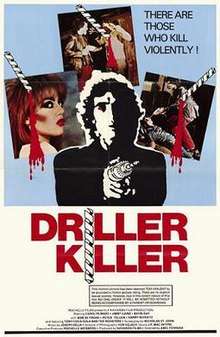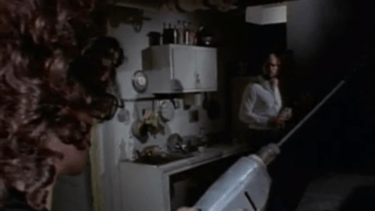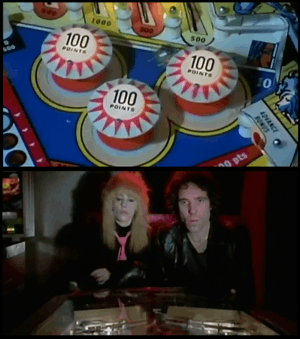The Driller Killer
| The Driller Killer | |
|---|---|
 Theatrical release poster | |
| Directed by | Abel Ferrara |
| Produced by | Rochelle Weisberg |
| Written by | Nicholas St. John |
| Starring |
Abel Ferrara (as Jimmy Laine) Carolyn Marz Baybi Day Harry Schultz Alan Wynroth |
| Music by | Joseph Delia |
| Cinematography | Ken Kelsch |
| Edited by |
Bonnie Constant Michael Constant Orlando Gallini Abel Ferrara (as Jimmy Laine) |
| Distributed by |
Rochelle Films Cult Epics |
Release date |
|
Running time | 96 minutes |
| Country | United States |
| Language | English |
The Driller Killer is a 1979 black comedy horror film directed by Abel Ferrara and starring Ferrara (credited as Jimmy Laine), Carolyn Marz, Baybi Day, and Harry Schultz. The plot concerns Reno Miller, a struggling artist in New York City, turning insane from stress and killing derelicts with a power drill.
The film was infamous for being on the list of "video nasties" in the United Kingdom, resulting the film banned from 1984 (due to new censorship laws) until 1999, when a cut version was approved for an 18 (years of age) certificate. The full uncut version was finally passed by the BBFC in November 2002. On 10 June 2010 it was re-released as video on demand (VOD).[1]
The film is now in the public domain.[2]
Plot
Artist Reno Miller (Abel Ferrara) and his girlfriend Carol enter a small Catholic church, where he approaches an elderly bearded man (revealed as Reno's estranged derelict father) kneeling at the pulpit. The derelict seizes Reno's hand, causing him and Carol to flee from the church, unknown to him that the derelict contained a paper with Reno's information and requested a meeting with him. Reno denies knowing who the derelict was.
Later, at his apartment, Reno receives a large Con-Ed electricity bill, the phone bill and cannot pay his rent. He shares an apartment with Carol, a former flight attendant, and her drug-addicted lover Pamela, in a derelict-filled neighbourhood in Union Square. Reno visits Dalton, an art gallery owner, and tells him that he is currently painting a masterpiece. Reno asks for a week’s extension and a loan of $500 to cover the rent, however Dalton refuses, saying that he already lent enough money to Reno. However, if Reno finishes a satisfactory painting in one week, Dalton will buy it for the necessary amount.
The following day, a No Wave band entitled the Roosters begin practising their music in a nearby apartment, in which the music makes Reno unnerved and frustrated. At 2:00 in the morning, Reno becomes more agitated from the Roosters' music while painting. After seeing his own image saturated in blood, Reno walks the streets in the dark. He sees an elderly derelict sleeping in a garbage-strewn alley, where he grabs the bum and begins ranting. Reno ducks with the bum into the alley where they see a small group of teenage gang members chasing another homeless bum down the street. When the gang members are gone from sight, Reno drops the bum to the ground and walks away, vowing that he will not end up like a derelict.
The next day, Reno complains about the Roosters to their landlord. However, the landlord refuses to act because the music does not bother him (implying that the band bribes him to ignore their loud music). He gives Reno a skinned rabbit for dinner, but instead demands the rent money. Reno takes the rabbit home and repeatedly stabs it while preparing it. During a brief reprieve from the music, Reno mentally hears voices calling his name and sees an image of an eyeless Carol. That night, Reno leaves outside and armed with a power drill connected to a portable battery pack. He discovers another derelict inside an abandoned building and brutally kills him. The following evening, Reno, Carol, and Pamela see Tony Coca-Cola and the Roosters at a nightclub. As the Roosters play, Reno becomes irritated by the music and crowd and leaves while Carol and Pamela dance and kiss.

Reno returns to his apartment, grabs his drill and goes out on a killing spree. Throughout the night, Reno kills a number of homeless bums all over the city before returning home to sleep. Later, Tony visits Reno’s apartment and asks Reno to paint a portrait of him, in which Tony agrees to pose for Reno's demand of $500 rent bill. As Reno paints, Tony poses by playing his guitar and kissing Pamela. A derelict in a nearby alley (upset by the noise) is later attacked and killed by Reno. Afterwards, Reno completes his painting, where he then wakes and notifies Pamela and Carol.
The next day, Reno and Carol show the painting to Dalton who leaves after declaring it “unacceptable” and Carol yells at Reno for sitting with a blank facial expression, resulting her leaving Reno for her ex-husband Stephen by the next morning. That evening, Reno calls Dalton and invites him to see another painting. When Dalton arrives as the Roosters are practising, a dressed-up Reno kills him with his drill. After visiting the Roosters, Pamela returns to the apartment where, upon the discovery of Dalton’s body inside, she flees into the hallway before Reno grabs her. Pamela's fate is left ambiguous.
Across town, Carol is back with Stephen at his apartment. She takes a shower while Stephen prepares tea. Reno enters the apartment, kills Stephen, and then hides his body behind a kitchen counter. Carol, exiting from her shower, walks to the bedroom where Reno hides under the bed covers. She turns off the lights, gets into bed, and tells Stephen to "come here..."; The film suddenly ends, leaving Carol's ultimate fate unknown.
Cast
- Abel Ferrara (credited as Jimmy Laine) – Reno Miller
- Carolyn Marz – Carol
- Baybi Day – Pamela Bergling
- Harry Schultz II – Dalton Briggs
- Alan Wynroth – Landlord
- Maria Helhoski – Nun
- James O'Hara – Man in church
- Richard Howorth – Carol's husband
- D.A. Metrov (credited as Rhodney Montreal) – Tony Coca-Cola
Ferrara claims that Bruce Willis appeared in the film.[3]
Production

The Driller Killer is a low-budget, independent feature, with a cast of unknown actors, produced by Ferrara's own Navaron Films company 1977–78. It was filmed on 16mm film and utilised Ferrara's Union Square apartment and adjacent streets as locations.[4] It features many of the elements that became trademarks of Ferrara's later films. These include Catholic iconography, lesbian scenes, gritty urban locations filmed at night, an eclectic soundtrack combining punk rock and Bach, scenes of extreme violence and a religious theme of redemption, salvation and damnation.[5] The punk rock band in the movie reflects contemporary New York punk bands such as the New York Dolls and Television.[6]
In the Driller Killer trailer, Reno is heard to say a line from a scene that does not appear in the finished movie: "It's just a window, Dalton." [7]
The uncut version of the movie cuts to a black screen during the scene in which Dalton is murdered, as well as during the end scene in which Reno hides under Carol's bed covers. Instead of a black screen, the British BBFC 18 version cuts to a red screen during these two scenes.
As a final footnote in the film's history, when Arrow Films was preparing the film for re-release (the edition came out in November 2016), they discovered that the print they had was five minutes longer than any previous release on the film. They contacted Ferrara, who confirmed that it was a pre-release version, and that he had intentionally removed the footage prior to the release of the theatrical version. Arrow obtained permission to include this version as an extra in their release. The additional five minutes are all in the first half of the film and appear at seven points, including a shot of a zeppelin lasting just a few seconds, a brief lesbian shower scene, and an argument scene lasting a full two-and-a-half minutes. Most of the new footage relates to the characters' development and backstory.[8]
Censorship
The film was released theatrically in America without controversy in 1979. In the United Kingdom, however, the reaction to the video release was very different.[9] In 1982, the UK distributors of Driller Killer, Vipco (Video Instant Picture Company) took out full page advertisements in a number of movie magazines showing the video's violently explicit cover, depicting a man being drilled through the forehead by the Driller Killer.[9] The tagline for the advertising and video box was: "There are those who kill violently."[7]
The advertising resulted in a large number of complaints to the Advertising Standards Agency, and opposition to the film from the press and elsewhere; however, it seems that very few of the complainants ever saw the film but based their opinion on the poster and title.[9]
The film was lumped together with other "video nasties" released at the time and a vociferous campaign was launched by the press to ban them all. Driller Killer was added to the list of banned UK films on 4 July 1983, just a year after its release date.[7] According to Mike Bor, the Principal Examiner at the British Board of Film Classification, "The Driller Killer was almost single-handedly responsible for the Video Recordings Act 1984" under which it and others of the "video nasties" released at the time were banned in the U.K.[9] According to Brad Stevens, author of a biography on Abel Ferrara, the banning of the film was "almost entirely due to the cover of the video." [7] The film was classified R 18+ in Australia by the Australian Classification Board and released uncut on home video on April 29, 1985. It was released on DVD twice in the country: first by Umbrella Entertainment and again on August 9, 2013, when it was re-rated MA 15+.
The film was not officially released uncut in the UK until 2002.
Reception
The Driller Killer has a 69% approval rating on Rotten Tomatoes based on 13 reviews; the average rating is 6.1/10.[10]
Remake plans
In 2007, it was announced that the film would be remade by British film maker Andrew Jones.[11] It was reported that this new version of the film would also feature many unusual cameos and an original musical score. The remake would have moved the setting from New York to London and starred David Hess. Andrew Jones contacted Baybi Day to help co-produce and have a small acting role in the remake of Driller Killer. The title of the remake was designated Driller Killer Redux. The project came to a halt after a financial deal between the executive producers and the two people who held the rights to the original movie could not be reached.[12]
See also
References
- ↑ "Killer Online Double Feature on Friday!". Dreadcentral.com. Retrieved 2010-12-26.
- ↑ Baker, Chris (1 October 2006). "The Best: Movies in the Public Domain". Wired (magazine). Retrieved 15 March 2018.
- ↑ "The Driller Killer (1979) Review". 7 October 2009. Retrieved 11 May 2015.
- ↑ Nick Johnstone (1999). Abel Ferrara: The King of New York. Omnibus Press: 8-9
- ↑ Nick Johnstone (1999). Abel Ferrara: The King of New York. Omnibus Press: 2
- ↑ Nick Johnstone (1999). Abel Ferrara: The King of New York. Omnibus Press: 46
- 1 2 3 4 Video Nasties: The Definitive Guide. Nucleus Films
- ↑ "Comparison of Theatrical Version and the Pre-Release Version of 'The Driller Killer'". movie-censorship.com. Retrieved 2017-02-18.
- 1 2 3 4 Nick Johnstone (1999). Abel Ferrara: The King of New York. Omnibus Press: 13
- ↑ "The Driller Killer (1979)". Rotten Tomatoes. Retrieved May 18, 2018.
- ↑ Felix Vasquez Jr. (18 January 2007). "UK remake of cult classic 'Driller Killer'". Twitch.com. Retrieved 17 January 2012.
- ↑ MJ Simpson. "MJ Simpson Interview with Andrew Jones". MJ Simpson. Retrieved 28 January 2012.
External links
- The Driller Killer is available for free download at the Internet Archive
- The Driller Killer on IMDb
- The Driller Killer on YouTube